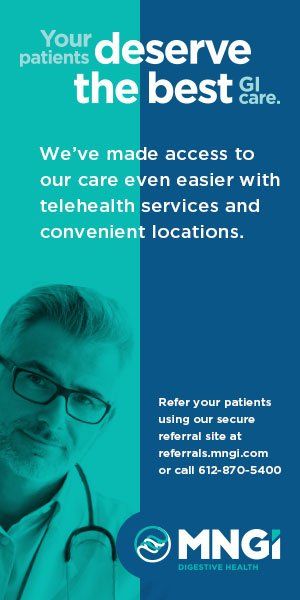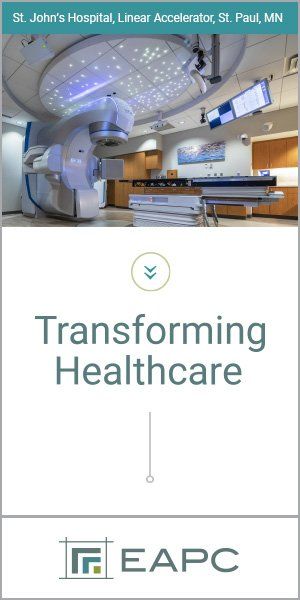Capsules
U of M Medical School Ranks Eight in Public School Research Funding
Recently the 2022 Blue Ridge Rankings were released, and the University of Minnesota Medical School has moved to number eight (up from number 13 last year) for funding from the National Institutes of Health among all public medical schools. With more than $340 million in funding, the U of M Medical School earned 554 NIH awards in disciplines such as biochemistry, emergency medicine, otolaryngology, neurology and family medicine and community health. “I’m especially proud of what this represents—the incredible work of our faculty and researchers in pursuit of medical discovery, treatments and cures,” said President Joan Gabel. “This important achievement adds to the University’s legacy of translating research into meaningful impact for Minnesotans and the world.” Tim Schacker, MD, vice dean for research at the Medical School stated, “Our faculty and the staff who support them have worked hard to succeed in the competitive environment of NIH funding.” The Medical School Research Office has been instrumental in aligning resources and priorities. For example, the Academic Investment Research Program (AIRP) at the Medical School invests seed funding that leverages successful NIH grant applications. This year alone, the Medical School invested $13.7 million in large center grants that returned more than $122 million in externally funded grants. “The value of the ranking is that first it acknowledges the incredible work of our faculty and staff, in partnership with the State of Minnesota, to advance health and health care in areas of greatest need, like cancer, aging and infectious disease,” said Jakub Tolar, MD, PhD, dean of the Medical School and vice president for clinical affairs. “The ongoing benefit is the reputational pull faculty, staff and students—the ability to work with the best—that will continue to build on itself. This means the best physicians and teams are here providing care to Minnesotans.” The Blue Ridge Institute for Medical Research is a nonprofit organization that ranks U.S. medical schools by NIH grant awards each year. Learn more about NIH funded research from the U of M Medical School at www.med.umn.edu/blue-ridge-rankings.
Jones-Harrison Opens Onsite Dialysis Center
Jones-Harrison Senior Living (Jones-Harrison), an independent industry leader for over 135 years, has recently expanded its services to include an onsite dialysis center. Providing assisted living, memory care, long-term care and transitional care/rehabilitation, Jones-Harrison can now add life-sustaining kidney care to its list of residential services. Through a partnership with DaVita Dialysis, a national leader in the dialysis field, this new service improves residents’ lives in many ways. Those with kidney problems can dialyze conveniently and comfortably where they live, which reduces stress, provides smoother care coordination and eliminates travel time and costs. The ability to receive treatment where they live improves convenience and flexibility, while advancing patient quality of life. It also leads to improved outcomes. Coordinated, high-quality onsite care can yield fewer adverse events and hospitalizations while mitigating population exposure to COVID-19 and other infectious diseases. The new service can streamline hospital discharge and potentially reduce readmissions and length of stay. The new facility was created by remodeling almost 700 square feet of existing space. There are six stations with recliner chairs and up to 12 people can dialyze per day. Appointments may be scheduled Monday-Saturday and are managed by an onsite RN, dialysis technician and Jones-Harrison Staff. The space includes a large screen TV, Internet, ceiling air diffusers and a biomedical storage room. It is the second onsite dialysis center in Minnesota. “By listening to what our community, we recognize the need for this new model of onsite dialysis services. It allows residents who depend on dialysis to do so right where they live, which is life-changing,” said Annette Greely, CEO of Jones-Harrison Senior Living. “We continue to innovate for our community and are excited to collaborate with DaVita, which positions Jones-Harrison as a top choice for senior living in Minneapolis.” Dan Viaches, president of DaVita SNF Dialysis, added, “We bring 20 years of experience as a leading kidney care provider and appreciate Jones-Harrison Senior Living trusts us to deliver high-quality care to the patients they serve.”
New Surgery Center Opens in Moose Lake
St. Luke’s and Gateway Family Health Clinic have partnered together to open the new Northern Lakes Surgery Center in Moose Lake. The multimillion-dollar investment expands health care in the region by bringing high-quality surgical care and outstanding clinical outcomes to the residents of Moose Lake and surrounding communities in a state-of-the-art facility. “Now in the convenience of our own community, people are able to have several types of surgeries and procedures from colonoscopies to cataract surgery to gallbladder removal without needing to drive 100 miles,” said Gateway Clinic Administrator and Northern Lakes Surgery Center Board Vice President Eric Nielsen, MBA, CMPE. “Giving our patients this added convenience and helping them avoid long trips, especially in the winter, is invaluable.” Other features of the new facility include accessibility, with close parking and private patient pickup after surgery. As a freestanding surgery center, Northern Lakes Surgery Center also has typically lower costs than for surgical services provided in a hospital setting. “We are excited to partner with Gateway, not only to offer health care that’s more accessible and affordable, but also to provide the highest quality of care,” said St. Luke’s president, CEO & CMO Nick Van Deelen, MD. “We value being a trusted part of the communities we serve and look forward to serving more of our neighbors in the Moose Lake area.” The surgery center uses approximately 9,000 of the 25,000 square feet of the building in St. Luke’s Plaza, with the additional space for future tenants. To learn more, visit www.NorthernLakesSurgery.com.
Mental Health Collaboration Hub Now Active
After extensive development and design, the Mental Health Collaboration Hub (Hub) has officially launched for operation. The online portal allows hospitals and care providers across the state to connect 24/7 when youth in boarding situations are in need of mental health treatment and safe living environments. A boarding situation describes when an individual, often in a crisis, has been assessed and determined to require admission to treatment or transfer, but for whom there is no available safe placement. There are currently 60 organizations and over 170 users registered in the system. Organizations can register on the homepage. The Hub administrator will then review and approve the profile (typically within 24 hours), and you can establish and profile as many users as you need for your organization. This can include social workers, nurses, case managers and other administrators.
The Hub is accessible to any health and human service organization in Minnesota, including hospitals, emergency departments, counties, shelters, residential programs, group homes, foster care agencies and more. Users submit case information into the Hub, which connects them to providers across the state. The Hub helps to match appropriate providers based on selected criteria that includes the recommended care setting, age, gender, diagnosis and other medical needs. All users can view open cases and collaborate on any of them to help those in need. The Hub facilitates weekly video calls that are open to all users to interact in real-time. The most common “boarding situations” are in hospitals and emergency departments. Users in any setting may use the Hub to connect with safe living and mental health treatment settings such as group homes and residential programs. The Hub is managed by the statewide Psychiatric Assistance Line (PAL) through a grant from the Minnesota Department of Health and with administrative support from the Metro Health Coalition and AspireMN. There is no protected health information (PHI) stored in the Hub. It does not collect names, birth dates or any patient contact information. Each case is assigned a real-time random ID number that includes biological gender and age for reference. Clinical information is selected from drop down lists that include things like presenting factors, diagnosis and other special needs. Only users who create cases can edit them. For more information, please visit:https://mnpsychconsulthub.com/.
CMS Advances Prior Authorization Reform
The Centers for Medicare & Medicaid Services (CMS) has recently taken important steps toward right-sizing the prior authorization process imposed by Medicare Advantage plans on medical services and procedures. Among many proposed reforms, CMS is addressing new provisions for Medicare Advantage plans that would:
- Disallow prior authorization as a tool used to delay or discourage care.
- Give beneficiaries access to the same items and services as they would have under traditional Medicare.
- Establish a utilization-management committee to review their clinical coverage criteria and ensure consistency with traditional Medicare guidelines.
- Disallow denial of care ordered by a contracted physician based on a particular provider type or setting.
- Keep prior authorization approvals valid for the duration of the course of treatment.
- Provide beneficiaries with a 90-day transition period where during which a prior authorization would remain valid for any ongoing course of treatment when beneficiaries change plans or enter Medicare Advantage.
- Disallow retroactive denial of coverage for a lack of medical necessity after a prior-authorization approval.
A Kaiser Family Foundation analysis found Medicare Advantage plans denied two million prior authorization requests in whole or in part, representing about six percent of the 35 million requests submitted in 2021. While about 11 percent of denials were appealed, the vast majority—82 percent—of appealed denials were fully or partially overturned, raising serious concerns about the suitability of many of the initial denials. The AMA has been a leading advocate for these reforms. Current AMA President Jack Resnick, MD, said “Waiting on a health plan to authorize necessary medical treatment is too often a hazard to patient health. To protect patient-centered care for the 28 million older Americans who rely on Medicare Advantage, physicians urge CMS to finalize the proposed policy changes and strengthen its prior authorization reform effort by extending its proposals to prescription drugs.” Data on AMA initiatives around these reforms can be found at Recovery Plan for America’s Physicians.
MDH Convenes Long COVID Guiding Council
The Minnesota Department of Health (MDH) has partnered with Stratis Health and consultants from the former Institute for Clinical Systems Improvement (ICSI) to form the long COVID Guiding Council (Guiding Council), a network of 20 primary care providers and specialists who are treating long COVID patients from across the state of Minnesota. The focus of the Guiding Council is to develop strategies to educate providers and help them implement processes and policies that will improve access and quality of long COVID care. “Clinicians are telling us that there is very little communication among the care providers who see long COVID patients and that a coordinated learning network would increase access to care and the quality of care that is provided,” said Dr. Ruth Lynfield, state epidemiologist and medical director. “We still have a lot to learn about long COVID. But laying the groundwork to expand awareness about the emerging evidence and the available treatments is an important first step toward improving outcomes for those suffering from the impacts of long COVID.” The effects of COVID-19 can vary greatly, from cold and flu-like symptoms to life-threatening complications. Recovery can be similarly complicated. Not everyone who contracts COVID-19 makes a fast or full recovery. Tens of thousands of Minnesotans face ongoing or new symptoms such as shortness of breath, extreme fatigue, headaches, dizziness, brain fog and more. With appropriate medical care, many people can manage their symptoms and improve their health and quality of life. Unfortunately, all too often Minnesotans experiencing lasting symptoms after a COVID-19 infection do not recognize they are experiencing long COVID. “Making sure we prevent disparities in access to diagnosis, treatment and supports for long COVID is critical,” said Dr. Nathan Chomilo, medical director for Medicaid and MinnesotaCare at MDH and Guiding Council member. “For Minnesotans served by our Medicaid program, that starts with ensuring that recognition and diagnosis captures how long COVID may compound challenges they already face and includes ensuring the supports and services they need are covered.” To better understand the lasting effects of COVID-19 on the lives of Minnesotans, MDH has launched two post-COVID surveys among people who have had COVID-19—one statewide and one in McLeod County. More information about long COVID and MDH’s work, along with resources and recovery support information, are available on the MDH long COVID website.
MORE STORIES IN THIS ISSUE
cover story one
Mission Management: Connecting hospital trustees and physicians
By Daniel K. Zismer, PhD
cover story two
Generation Now Nursing: Redefining the value proposition













